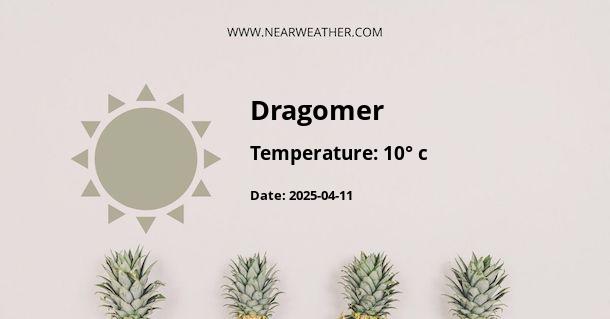A Comprehensive Overview of Dragomer, Slovenia's Climate and Weather
In the charming country of Slovenia, nestled at the crossroads of major European cultural and trade routes, lies the quaint settlement of Dragomer. This locale experiences a climate that is a harmonious blend of the Alpine, Mediterranean, and Continental climates, reflecting Slovenia's unique position. Geographically, Dragomer is situated in the Ljubljana Basin in Central Slovenia, which significantly influences its weather patterns throughout the year. Understanding Dragomer's climate is crucial for residents, tourists, and businesses alike, as it affects everything from clothing choices to travel plans and agricultural practices.
General Climatic Conditions of Dragomer
Dragomer experiences a humid continental climate (Köppen climate classification: Dfb), characterized by noticeable differences between seasons, a moderate amount of precipitation spread throughout the year, and variations in temperature. The region is under the influence of both the warm Adriatic Sea and the cold Alpine winds, which are responsible for the diverse weather conditions.
Temperature Variations Throughout the Year
Dragomer's temperatures fluctuate significantly over the seasons, with warm summers and cold winters. The average monthly temperatures range from -2°C in the coldest month of January to about 20°C in the warmest month of July, although occasional extremes can be experienced during heatwaves or cold spells.
Precipitation Patterns
Precipitation in Dragomer is relatively well-distributed throughout the year, with a slight increase during the summer months due to convective rainfall. On average, the total annual precipitation amounts to approximately 1400 mm, which supports the lush green landscapes of the region.
Seasonal Weather Conditions in Dragomer
Each season in Dragomer has its distinct weather patterns, which directly impact the activities and lifestyle in the region.
Spring
- Temperature: Spring witnesses a gradual rise in temperatures, with averages moving from around 8°C in March to 15°C by the end of May.
- Precipitation: This is a moderately wet season, with frequent rain showers that contribute to the blooming flora.
- Special Considerations: Late frost can occur, presenting a risk for early blossoming plants and agriculture.
Summer
- Temperature: Summers are generally warm, with daily highs often exceeding 25°C, providing excellent conditions for outdoor activities.
- Precipitation: Thunderstorms are common, especially in the afternoon, leading to heavier rainfall events that are often short-lived.
- Special Considerations: Heatwaves can pose health risks, especially for the elderly and those engaging in strenuous outdoor activities.
Autumn
- Temperature: Temperatures start to decline rapidly, with averages falling from 15°C in September to around 5°C in November.
- Precipitation: Autumn is generally characterized by an increase in rainfall and the first snowfalls can occur, particularly towards the end of the season.
- Special Considerations: Foggy conditions are more prevalent, reducing visibility and affecting transportation.
Winter
- Temperature: Winters are cold, with January being the coldest month. Snow cover is common, and temperatures can drop below freezing, particularly during the night.
- Precipitation: Snowfall contributes to the precipitation totals, which are generally lower than in other seasons.
- Special Considerations: Ice and snow can disrupt travel and require adequate winter equipment for vehicles and outdoor activities.
Extremes in Weather
While the typical climate of Dragomer promotes a relatively stable weather pattern, extreme events do occur. These include severe thunderstorms, intense heatwaves, and cold snaps, all of which have implications for infrastructure, health, and the economy. Proactive measures and informed planning are necessary to mitigate the risks associated with these occasional extremes.
Climate Change Considerations
Evidence suggests that climate change is impacting weather patterns in Slovenia, including Dragomer. Trends indicate a gradual increase in temperatures and shifts in precipitation, which could lead to more frequent and severe weather events. Adapting to these changes and implementing sustainable practices is critical to preserve the natural beauty and livability of the region.
Conclusion
In conclusion, Dragomer's climate with its variations and complexities is not just of academic interest but of practical importance to the activities of its inhabitants and visitors. A detailed understanding of the climatic behavior allows for better preparation and adaptation, ensuring that the natural challenges presented by the weather can be met with resilience and foresight.
Monthly Weather Overview Table for Dragomer
| Month | Average High (°C) | Average Low (°C) | Precipitation (mm) |
|---|---|---|---|
| January | 3 | -2 | 70 |
| February | 7 | -1 | 80 |
| March | 12 | 1 | 90 |
| April | 16 | 5 | 100 |
| May | 21 | 10 | 110 |
| June | 24 | 13 | 120 |
| July | 27 | 15 | 100 |
| August | 26 | 14 | 120 |
| September | 22 | 11 | 140 |
| October | 16 | 7 | 150 |
| November | 10 | 3 | 180 |
| December | 5 | 0 | 120 |
Please note: The above table provides a generalized overview. A more detailed and specific forecast can yield variations depending on the current weather patterns.
A - Dragomer's Latitude is 46.016670 & Longitude is 14.383330.
A - Weather in Dragomer is 10° today.
A - Climate Conditions in Dragomer shows clear sky today.
A - Humidity in Dragomer is 60% today.
A - Wind speed in Dragomer is 4.46 km/h, flowing at 243° wind direction. today.
